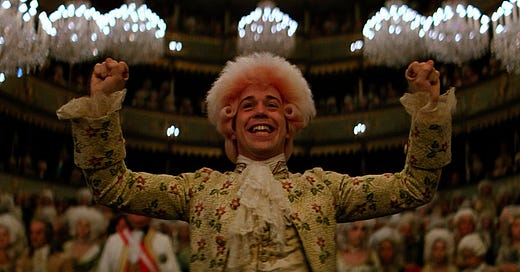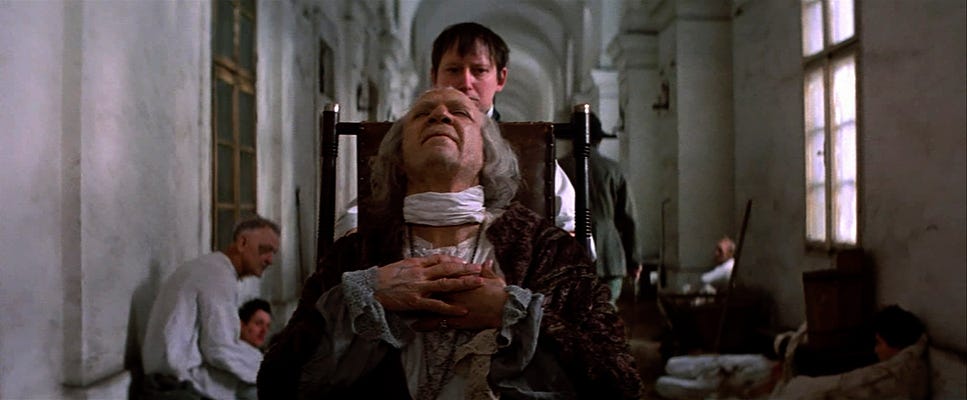40 years later, Amadeus remains a timeless cautionary tale of creative suppression
Released 40 years ago today, Milos Forman’s Best Picture-winning epic showed why making challenging, original art is both vital and dangerous in an industry that seeks to maintain the status quo.
“Forgive me, Majesty. I am a vulgar man. But I assure you, my music is not.”
During one of the most crucial and resonant scenes in Milos Forman’s 1984 masterpiece Amadeus, a young and budding Mozart (Tom Hulce) pleads to Emperor Joseph II (Jeffrey Jones) and his stuffy colleagues about conducting the forbidden, controversial opera The Marriage of Figaro. Despite Mozart’s enthusiasm for the story and his ambitious ideas to elevate it, the emperor and his staff are ambivalent, dismissing the theater piece as a “vulgar farce” that could potentially stir up class warfare and suggesting that “gods and legends” are more interesting than stories about real people. Mozart retorts back, asking why they’d prefer characters “so lofty they sound as if they shit marble.” His profanity provokes a negative, stupified reaction from everyone, but Mozart utters the line above as a way to show that just because he’s obscene does not mean he’s inept. He goes on to physically lay out his plan for the opera, which successfully convinces the emperor to let him produce it.
Though this moment isn’t explicitly about the tension between art and commerce in today’s entertainment world (or perhaps the world of 40 years ago when Amadeus was released), it very much plays like a filmmaker trying to pitch an original idea to a room full of executives who’d rather he make a Marvel movie or any blockbuster that’s broadly appealing enough to be commercially viable. Whether or not Forman or screenwriter Peter Shaffer intentionally wrote and staged this scene to evoke such an idea, the moment is an eerie parallel to the current sanitization of the film and TV landscape, where those in power are becoming more and more inclined to appease and pander to the masses rather than finance, produce, and distribute art that could potentially embolden them.
Risk aversion is nothing new in Hollywood, but the worrisome trends within the industry over the past few years — Marvel/IP domination fatigue, post-#MeToo discomfort around cinematic depictions of sexuality and gender/power dynamics, the streaming monopoly, the ominous threat of AI, the attention-consuming advent of TikTok and short-form content, social media influencers and online hype replacing cultural criticism — have produced a creative environment that is both antiseptic and apolitical. On top of all that, there’s so little room for original, personal, mid-budget studio films anymore, with opportunities for screenwriters remaining stagnant following the WGA strike and indie-turned-mainstream filmmakers needing to helm more commercial work to secure health insurance or maintain momentum in their careers. Even established directors and longtime pop culture fixtures like John Waters and David Lynch can’t get work made now.
Like Emperor Joseph and his staff, the anxiety of ruffling people’s feathers seems to matter more than the ideas and ambitions of people who labor to entertain them. But throughout Amadeus, Mozart’s inspiring combination of charisma, uniqueness, nerve, and talent (to quote RuPaul) proves just how important and necessary it is to give artists the platform to not only subvert the status quo, but expand it to realms that weren’t even initially thought possible.
Amadeus itself is exactly the kind of movie that could push the envelope of what storytelling could do. It’s a heavily fictionalized historical epic that imagines a one-sided, vaguely homoerotic beef between the revered Mozart and the less-talented but no less devoted composer Antonio Salieri (F. Murray Abraham). For a film that’s 3 hours long (or 2 hours and 40 minutes if you watch the theatrical cut) set in pre-20th century Europe, Amadeus is very accessible and wildly entertaining, filled to the brim with luxurious set decoration, decadent costume design, electric dialogue, cheeky humor, uniformly excellent performances from a perfectly cast ensemble, and of course, riveting musical compositions. Its astonishing craftsmanship and soul-stirring insights put other music biopics to shame, smartly stitching us to Salieri’s outsider perspective rather than simply giving us a hagiographic treatment of Mozart. The film was a box-office success, grossing $90 million against an $18 million budget, and deservedly won 8 out of 11 Oscars, including Best Actor for Abraham, who beat Hulce in an amusingly ironic twist.
Besides its many technical and emotional strengths as a mythic retelling of Mozart’s brief but prolific career, perhaps what makes Amadeus most compelling is the clever and fun ways it takes dramatic liberties and the deep truths about ego and envy it draws out of those liberties. Although Salieri was a married family man in real life, Amadeus portrays him as a chaste, bitter old queen whose regaling of anecdotes to a hapless priest about his life and rivalry with Mozart functions as the film’s framing device. The Salieri of Amadeus is a fascinating tragic figure, acutely aware of and disappointed by his artistic limitations, but too consumed by rage over his middling skills to hone them, instead blaming his mediocrity as an unfair punishment by God. By aligning himself closely with Emperor Joseph, Salieri spends the film exploiting the monarchy’s ideological rigidity and artistic gatekeeping to try and sabotage Mozart, another embellishment that nevertheless gives Amadeus its captivating dramatic and emotional thrust.
Salieri’s conniving attempts to inhibit Mozart’s rising success — seducing and subsequently humiliating his wife Constanze (Elizabeth Berridge), hiring a young maid (an unexpectedly great Cynthia Nixon) to spy on him, having him instruct the 13-year-old daughter of a pair of annoying aristocrats — ultimately backfire, but he finds Mozart’s weakest spot when Mozart’s father Leopold (Roy Dotrice) passes away and Mozart conducts Don Giovanni, a massive, dark, sad production that gets a lukewarm reception. Salieri takes full advantage of Mozart’s grief and growing financial difficulties by appearing at Mozart’s door late at night as Leopold’s ghost, wearing the creepy black bird-like mask that adorns Amadeus’s poster as a disguise. He tells Mozart to write a Requiem in Leopold’s honor and secretly hopes that doing so will ultimately be the thing that kills Mozart.
Sure enough, Mozart not only writes the Requiem, but simultaneously takes on conducting The Magic Flute, a crowd-pleasing yet shallow opera that nonetheless becomes popular. The combination of being overworked and making concessions for the sake of money inevitably wears Mozart down, leading him to become exhausted, alcoholic, and alienated from his wife and child. This may be the most striking example of what I imagine filmmakers or really any artist are experiencing at this current moment: being forced to make compromises to sustain their livelihoods, making art that is well-liked by a wide audience but completely safe and toothless to the point of having little to no cultural impact, and needing to self-medicate to deal with those frustrations, all because people at the top are unable or unwilling to provide proper financial and creative support.
Cynical as this point may seem, Amadeus does give us a model of what collaboration between artists and those who oversee their work could look like in its beautifully tragic climax. A dying Mozart dictates the opening of Confutatis to Salieri, who transcribes the composition. The creative alchemy between the two, coupled with the clever, fragmented sound design that echoes the song they’re making as they build it, is invigorating and awe-inspiring to watch. Once they’ve finished, Mozart, completely sapped of life, asks for Salieri’s forgiveness, having assumed he did not care for him or his music when that could’ve been further from the truth. It’s a devastating final note to end their relationship on, offering a glimpse into what could’ve been a great creative partnership (the beauty of working it out on the remix!) were Salieri not so blinded by his resentment over having Mozart’s passion but not his gifts.
Originality will always be dangerous and intimidating to people who refuse to change, who are so squarely stuck in the comfortable familiarity of the past that anything that dares to arouse intellectual curiosity could be considered a potential risk — anything that has “too many notes,” as Emperor Joseph tells Mozart at one point. Given the fickle, borderline dystopian state of entertainment, it’s hard to know if artists and filmmakers interested in telling original stories will ever be given the same level of creative and monetary reverence as before. But as evidenced by Amadeus’ glorious final scene, in which Salieri finally embraces his mediocrity and the specter of Mozart’s iconic cackle rings in the air, great artists will always have the last laugh because their work will endure no matter what.






